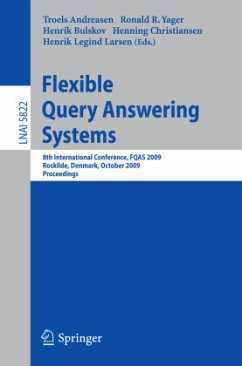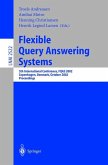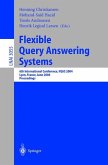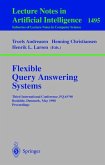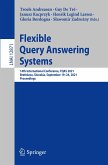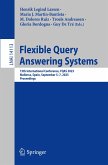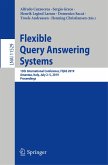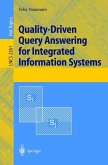Flexible Query Answering Systems
8th International Conference, FQAS 2009, Roskilde, Denmark, October 26-28, 2009, Proceedings
Herausgegeben:Andreasen, Troels; Yager, Ronald R.; Bulskov, Henrik; Christiansen, Henning; Larsen, Henrik Legind
Flexible Query Answering Systems
8th International Conference, FQAS 2009, Roskilde, Denmark, October 26-28, 2009, Proceedings
Herausgegeben:Andreasen, Troels; Yager, Ronald R.; Bulskov, Henrik; Christiansen, Henning; Larsen, Henrik Legind
- Broschiertes Buch
- Merkliste
- Auf die Merkliste
- Bewerten Bewerten
- Teilen
- Produkt teilen
- Produkterinnerung
- Produkterinnerung
This book constitutes the refereed proceedings of the 8th International Conference on Flexible Query Answering Systems, FQAS 2009, held in Roskilde, Denmark, in October 2009. The 57 papers included in this volume were carefully reviewed and selected from 90 submissions. They are structured in topical sections on database management, information retrieval, extraction and mining, ontologies and semantic web, intelligent information extraction from texts, advances in fuzzy querying, personalization, preferences, context and recommendation, and Web as a stream.
Andere Kunden interessierten sich auch für
![Flexible Query Answering Systems Flexible Query Answering Systems]() Troels Andreasen / Amihai Motro / Henning Christiansen / Henrik Legind Larsen (eds.)Flexible Query Answering Systems41,99 €
Troels Andreasen / Amihai Motro / Henning Christiansen / Henrik Legind Larsen (eds.)Flexible Query Answering Systems41,99 €![Flexible Query Answering Systems Flexible Query Answering Systems]() Henning Christiansen / Mohand-Said Hacid / Troels Andreasen / Henrik Legind Larsen (eds.)Flexible Query Answering Systems41,99 €
Henning Christiansen / Mohand-Said Hacid / Troels Andreasen / Henrik Legind Larsen (eds.)Flexible Query Answering Systems41,99 €![Flexible Query Answering Systems Flexible Query Answering Systems]() AndreasenFlexible Query Answering Systems41,99 €
AndreasenFlexible Query Answering Systems41,99 €![Flexible Query Answering Systems Flexible Query Answering Systems]() Flexible Query Answering Systems58,99 €
Flexible Query Answering Systems58,99 €![Flexible Query Answering Systems Flexible Query Answering Systems]() Flexible Query Answering Systems51,99 €
Flexible Query Answering Systems51,99 €![Flexible Query Answering Systems Flexible Query Answering Systems]() Flexible Query Answering Systems38,99 €
Flexible Query Answering Systems38,99 €![Quality-Driven Query Answering for Integrated Information Systems Quality-Driven Query Answering for Integrated Information Systems]() Felix NaumannQuality-Driven Query Answering for Integrated Information Systems41,99 €
Felix NaumannQuality-Driven Query Answering for Integrated Information Systems41,99 €-
-
-
This book constitutes the refereed proceedings of the 8th International Conference on Flexible Query Answering Systems, FQAS 2009, held in Roskilde, Denmark, in October 2009. The 57 papers included in this volume were carefully reviewed and selected from 90 submissions. They are structured in topical sections on database management, information retrieval, extraction and mining, ontologies and semantic web, intelligent information extraction from texts, advances in fuzzy querying, personalization, preferences, context and recommendation, and Web as a stream.
Produktdetails
- Produktdetails
- Lecture Notes in Computer Science 5822
- Verlag: Springer / Springer Berlin Heidelberg / Springer, Berlin
- Artikelnr. des Verlages: 978-3-642-04956-9
- Seitenzahl: 676
- Englisch
- Abmessung: 26mm x 156mm x 237mm
- Gewicht: 1031g
- ISBN-13: 9783642049569
- ISBN-10: 3642049567
- Artikelnr.: 27084423
- Herstellerkennzeichnung Die Herstellerinformationen sind derzeit nicht verfügbar.
- Lecture Notes in Computer Science 5822
- Verlag: Springer / Springer Berlin Heidelberg / Springer, Berlin
- Artikelnr. des Verlages: 978-3-642-04956-9
- Seitenzahl: 676
- Englisch
- Abmessung: 26mm x 156mm x 237mm
- Gewicht: 1031g
- ISBN-13: 9783642049569
- ISBN-10: 3642049567
- Artikelnr.: 27084423
- Herstellerkennzeichnung Die Herstellerinformationen sind derzeit nicht verfügbar.
Database Management.- A Flexible Querying Approach Based on Outranking and Classification.- Ranking Approximate Query Rewritings Based on Views.- A Model for Contextual Cooperative Query Answering in E-Commerce Applications.- Reasoning on Incompleteness of Spatial Information for Effectively and Efficiently Answering Range Queries over Incomplete Spatial Databases.- Abstracting Query Building for Multi-entity Faceted Browsing.- On Fuzzy vs. Metric Similarity Search in Complex Databases.- Querying Context-Aware Databases.- Information Retrieval.- An Exploratory Study on Using Social Information Networks for Flexible Literature Access.- Dynamically Personalizing Search Results for Mobile Users.- On the Selection of the Best Retrieval Result Per Query -An Alternative Approach to Data Fusion-.- Sociomapping in Text Retrieval Systems.- Query Reformulation Based on Relevance Feedback.- Multi-objective Query Optimization Using Topic Ontologies.- Effectiveness of Aggregation Methods in Blog Distillation.- Structural Relevance Feedback in XML Retrieval.- Query Disambiguation Based on Novelty and Similarity User's Feedback.- Extraction of 3D Feature Descriptor Using the Distribution of Normal Vectors.- Re-ranking Documents Based on Query-Independent Document Specificity.- Browsing Recommendation Based on the Intertemporal Choice Model.- Design of an Interface for Interactive Topic Detection and Tracking.- Representing Context Information for Document Retrieval.- Searching Multiple Artifacts: A Comprehensive Framework for Complex Search Situations.- Extraction and Mining.- Expected Answer Type Identification from Unprocessed Noisy Questions.- ONTOGRABBING: Extracting Information from Texts Using Generative Ontologies.- Mining Tree-Based Frequent Patterns from XML.- AutomaticWeb Pages Author Extraction.- Syntactic Extraction Approach to Processing Local Document Collections.- Conceptual Indexing of Text Using Ontologies and Lexical Resources.- Information Extraction from Text Based on Semantic Inferentialism.- Flexible SPARQL Querying of Web Data Tables Driven by an Ontology.- Trajectory Clustering via Effective Partitioning.- Semantically Expanding Questions for Supervised Automatic Classification.- GRAANK: Exploiting Rank Correlations for Extracting Gradual Itemsets.- Ontologies and Semantic Web.- Controlled Aggregate Tree Shaped Questions over Ontologies.- A Semantic Similarity Measure for Ontology-Based Information.- An Extendable Meta-learning Algorithm for Ontology Mapping.- Accessing and Documenting Relational Databases through OWL Ontologies.- A Formal Framework on the Semantics of Regulatory Relations and Their Presence as Verbs in Biomedical Texts.- Ontology Graphical Editor for Multilingual Document Search System.- Finding Top-k Approximate Answers to Path Queries.- Intelligent Information Extraction from Texts.- Extraction of Conditional and Causal Sentences from Queries to Provide a Flexible Answer.- Semantic Enrichment of Database Textual Attributes.- Interlingual Information Extraction as a Solution for Multilingual QA Systems.- Semantic Paraphrasing for Information Retrieval and Extraction.- Named Entity Recognition Experiments on Turkish Texts.- Advances in Fuzzy Querying: Theory and Applications.- Fuzzy Querying in Intelligent Information Systems.- Content-Based Retrieval of Audio in News Broadcasts.- Linguistic Summary-Based Query Answering on Data Cubes with Time Dimension.- About Bipolar Division Operators.- On Reaching Consensus by a Group of Collaborating Agents.- Dealing with Positive and Negative Query Criteria inFuzzy Database Querying.- Personalization, Preferences, Context and Recommendation.- Predicting Neighbor Goodness in Collaborative Filtering.- Content-Oriented Relevance Feedback in XML-IR Using the Garnata Information Retrieval System.- Exploiting Social Tagging Profiles to Personalize Web Search.- Incremental Personalised Summarisation with Novelty Detection.- Web as a Stream.- Stream Reasoning: A Survey and Further Research Directions.- Feed Querying as a Proxy for Querying the Web.
Database Management.- A Flexible Querying Approach Based on Outranking and Classification.- Ranking Approximate Query Rewritings Based on Views.- A Model for Contextual Cooperative Query Answering in E-Commerce Applications.- Reasoning on Incompleteness of Spatial Information for Effectively and Efficiently Answering Range Queries over Incomplete Spatial Databases.- Abstracting Query Building for Multi-entity Faceted Browsing.- On Fuzzy vs. Metric Similarity Search in Complex Databases.- Querying Context-Aware Databases.- Information Retrieval.- An Exploratory Study on Using Social Information Networks for Flexible Literature Access.- Dynamically Personalizing Search Results for Mobile Users.- On the Selection of the Best Retrieval Result Per Query -An Alternative Approach to Data Fusion-.- Sociomapping in Text Retrieval Systems.- Query Reformulation Based on Relevance Feedback.- Multi-objective Query Optimization Using Topic Ontologies.- Effectiveness of Aggregation Methods in Blog Distillation.- Structural Relevance Feedback in XML Retrieval.- Query Disambiguation Based on Novelty and Similarity User's Feedback.- Extraction of 3D Feature Descriptor Using the Distribution of Normal Vectors.- Re-ranking Documents Based on Query-Independent Document Specificity.- Browsing Recommendation Based on the Intertemporal Choice Model.- Design of an Interface for Interactive Topic Detection and Tracking.- Representing Context Information for Document Retrieval.- Searching Multiple Artifacts: A Comprehensive Framework for Complex Search Situations.- Extraction and Mining.- Expected Answer Type Identification from Unprocessed Noisy Questions.- ONTOGRABBING: Extracting Information from Texts Using Generative Ontologies.- Mining Tree-Based Frequent Patterns from XML.- AutomaticWeb Pages Author Extraction.- Syntactic Extraction Approach to Processing Local Document Collections.- Conceptual Indexing of Text Using Ontologies and Lexical Resources.- Information Extraction from Text Based on Semantic Inferentialism.- Flexible SPARQL Querying of Web Data Tables Driven by an Ontology.- Trajectory Clustering via Effective Partitioning.- Semantically Expanding Questions for Supervised Automatic Classification.- GRAANK: Exploiting Rank Correlations for Extracting Gradual Itemsets.- Ontologies and Semantic Web.- Controlled Aggregate Tree Shaped Questions over Ontologies.- A Semantic Similarity Measure for Ontology-Based Information.- An Extendable Meta-learning Algorithm for Ontology Mapping.- Accessing and Documenting Relational Databases through OWL Ontologies.- A Formal Framework on the Semantics of Regulatory Relations and Their Presence as Verbs in Biomedical Texts.- Ontology Graphical Editor for Multilingual Document Search System.- Finding Top-k Approximate Answers to Path Queries.- Intelligent Information Extraction from Texts.- Extraction of Conditional and Causal Sentences from Queries to Provide a Flexible Answer.- Semantic Enrichment of Database Textual Attributes.- Interlingual Information Extraction as a Solution for Multilingual QA Systems.- Semantic Paraphrasing for Information Retrieval and Extraction.- Named Entity Recognition Experiments on Turkish Texts.- Advances in Fuzzy Querying: Theory and Applications.- Fuzzy Querying in Intelligent Information Systems.- Content-Based Retrieval of Audio in News Broadcasts.- Linguistic Summary-Based Query Answering on Data Cubes with Time Dimension.- About Bipolar Division Operators.- On Reaching Consensus by a Group of Collaborating Agents.- Dealing with Positive and Negative Query Criteria inFuzzy Database Querying.- Personalization, Preferences, Context and Recommendation.- Predicting Neighbor Goodness in Collaborative Filtering.- Content-Oriented Relevance Feedback in XML-IR Using the Garnata Information Retrieval System.- Exploiting Social Tagging Profiles to Personalize Web Search.- Incremental Personalised Summarisation with Novelty Detection.- Web as a Stream.- Stream Reasoning: A Survey and Further Research Directions.- Feed Querying as a Proxy for Querying the Web.

